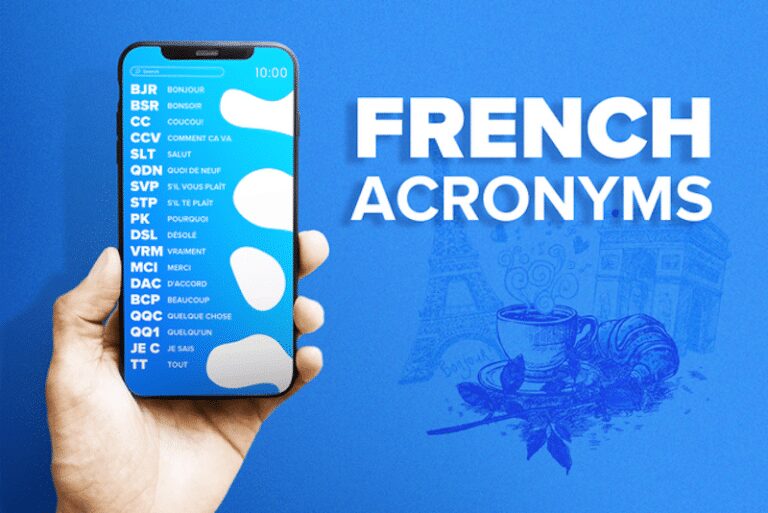The Easy Guide to Talking About Your Family in French

It probably doesn’t sound that difficult to converse without mentioning family. Think about it, though. How often in a conversation do you say something like, “Sorry, my dad keeps texting me.” “Oh, you like my sweater? Thanks! My husband gave it to me for Christmas.”
The list of ways our family members come up in conversation is endless, so we’ve put together this post to help you out.
Download: This blog post is available as a convenient and portable PDF that you can take anywhere. Click here to get a copy. (Download)
French Vocabulary Related to Family
Before we get into situations and phrases, let’s start with the basics. What is the French translation for terms related to family members?
Your Immediate Family
- Les parents (parents, or in a more generic sense, relatives of any kind)
- La mère (mother)
- Le père (father)
- La maman (mom or mommy)
- Le papa (dad or daddy)
- Le frère (brother)
- La sœur (sister)
- Les frères et sœurs (siblings)
That’s right, there’s no word for “siblings.” You just have to say “brothers and sisters.”
- La fille (daughter)
- Le fils (son)
- Les grands-parents (grandparents)
- La grand-mère (grandmother)
- Le grand-père (grandfather)
- La mémé (grandma)
- Le pépé (granddad)
- Les petits-enfants (grandchildren)
- La petite-fille (granddaughter)
- Le petit-fils (grandson)
- L’époux / l’épouse (spouse)
- Le mari (husband)
- La femme (wife)
- La belle-mère (mother-in-law)
The “in-laws” literally translate to “beautiful mother,” “handsome father,” etc. This translation really removes the negative stigma typically associated with in-laws!
- Le beau-père (father-in-law)
- Le beau-frère (brother-in-law)
- La belle-sœur (sister-in-law)
- La belle-fille (daughter-in-law)
- Le beau-fils (son-in-law)
- La belle-mère (stepmother)
You’ll notice that the “in-laws” and “steps” both translate to the same word. Confusing, isn’t it?
- Le beau-père (stepfather)
- Le beau-frère (stepbrother)
- La belle-sœur (stepsister)
- La belle-fille (stepdaughter)
- Le beau-fils (stepson)
- Le demi-frère (half-brother)
- La demi-sœur (half-sister)
Your Extended Family
- La cousine (female cousin)
- Le cousin (male cousin)
- Les cousins / les cousines (male or mixture of male and female cousins/female cousins)
- L’oncle (uncle)
- La tante (aunt)
- Le neveu (nephew)
- La nièce (niece)
Introducing Family Members in French
These are the phrases you would whip out at those work and social events, when having people over to your family’s home or if you run into someone you know on the street while out with a family member.
Formal Introductions
You would use these phrases when introducing family members at an event, or to elders and people you respect.
- Je vous présente… (I present to you…)
Remember to use vous to talk to people who are older or in a position of authority. For example, you might use this phrase when you introduce a family member to your boss or to a friend’s parent.
Monsieur, je vous présente mon mari, Daniel. (Sir, I present to you my husband, Daniel.)
Bonjour, Madame Thierry! Je vous présente ma mère. (Hello, Mrs. Thierry! I present to you my mother.)
- Je te présente… (I present to you…)
Use the tu form when speaking to a friend, an equal or someone younger than yourself. In this case, you are introducing a family member to someone who fits this profile, but while using a more formal structure:
Salut, Brigitte! Je te présente mon beau-frère, Charles. Charles, Brigitte est ma camarade de classe. (Hi, Brigitte! I present to you my brother, Charles. Charles, Brigitte is my classmate.)
- Il s’appelle… / Elle s’appelle… (His/her name is…)
Je te présente mon oncle. Il s’appelle Nico. (I present to you my uncle. His name is Nico.)
Bonjour, madame. Je vous présente ma tante. Elle s’appelle Esther. (Hello, ma’am. I present to you my aunt. Her name is Esther.)
Informal Introductions
You would use these informal introductions with your close pals. Sometimes people use these terms as quick introductions if they are in a hurry or distracted. Let’s say your mom randomly walks into the room while you guys are playing video games. You don’t have time for formalities, you’ve got dragons to kill!
- C’est… (This is…)
C’est is a casual way to say, “This is.”
Salut! C’est mon cousin. (Hi! This is my cousin.)
- Voilà… (Here is…)
This would be used in a situation when you are surprised to see someone. For example, if you weren’t expecting a family member to walk in at that moment, you use voilà as a quick announcement of their arrival.
Oh, voilà ma femme! (Oh, here is my wife!)
Practice Talking About Family in French
I bet you didn’t even think about how many family members existed until you saw that list. But don’t be overwhelmed! There are plenty of free online learning tools where you can practice memorizing all this vocabulary. Check out these simple exercises on The French Experiment.
Even watching videos in French can help you get used to new vocabulary. There are limitless videos to be found on YouTube. You can also now turn any YouTube video into a language learning lesson with FluentU.
FluentU takes authentic videos—like music videos, movie trailers, news and inspiring talks—and turns them into personalized language learning lessons.
You can try FluentU for free for 2 weeks. Check out the website or download the iOS app or Android app.
P.S. Click here to take advantage of our current sale! (Expires at the end of this month.)
Of course, you can talk in-depth about your family for hours.
But hopefully these basics will get you started!
This way, when a date or coworker asks you about your family, you won’t have to go hide out in the bathroom to avoid the conversation.
Download: This blog post is available as a convenient and portable PDF that you can take anywhere. Click here to get a copy. (Download)
And One More Thing...
If you like learning French at your own pace and from the comfort of your device, I have to tell you about FluentU.
FluentU makes it easier (and way more fun) to learn French by making real content like movies and series accessible to learners. You can check out FluentU's curated video library, or bring our learning tools directly to Netflix or YouTube with the FluentU Chrome extension.
One of the features I find most helpful is the interactive captions—you can tap on any word to see its meaning, an image, pronunciation, and other examples from different contexts. It’s a great way to pick up French vocab without having to pause and look things up separately.
FluentU also helps reinforce what you’ve learned with personalized quizzes. You can swipe through extra examples and complete engaging exercises that adapt to your progress. You'll get extra practice with the words you find more challenging and even be reminded you when it’s time to review!
You can use FluentU on your computer, tablet, or phone with our app for Apple or Android devices. Click here to take advantage of our current sale! (Expires at the end of this month.)













